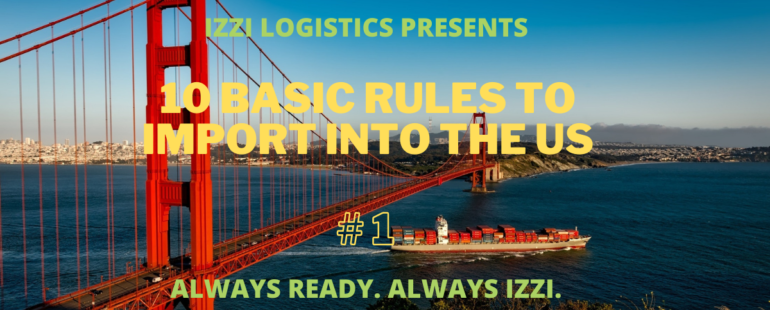
The importing industry is lucrative and exciting. However, if you are new to it, you will soon learn that there is a lot you need to know before jumping into it.
There is no need to feel overwhelmed; we have taken up the responsibility of sharing easy guides on all there is to know regarding this trading transaction.
Essentially, there are around ten basic rules when it comes to importing into the U.S. In this guide, we will be talking about the first and foremost one, which involves the importer.
An importer, be it an individual or a company, is liable for any payments of duties and taxes imposed on imported goods. It is also important to mention that an importer may be a resident or a non-resident of the U.S.
As an Importer of Record (IOR), it falls upon your shoulders to fulfill a certain list of responsibilities related to the shipment you will import. For that, it is crucial that before you think of importing anything into the U.S, you are fully informed of your responsibilities and the rules and regulations you must meet to import successfully.
To simplify your understanding, we have categorized the responsibilities of an Importer as the following:
- Responsibilities related to the Shipment: which involve collecting the necessary shipment information and producing specific documentation.
- Responsibilities related to Customs: which involve being aware and abiding by the rules and regulations determined by Customs.
Shipment Responsibilities
- Product Classification
The importer must accurately classify the product, which is usually done through an international coding system, formally known as the Harmonized Tariff Schedule. The product code, referred to as the HS Code, determines the customs duties to be applied and enforces other import regulations. Here is a link containing an archive of product codes that might help you get an estimate of your customs duties.
- Marking of the Country of Origin
Everything imported into the U.S. must be marked with the country of origin, including the commercial value. The country of origin determines the duties and quota rules that will be subjected to the shipment.
- Value Determination
You must accurately declare the shipment value. Undervaluing your shipment value to avoid duties will have dire consequences that will include fines, criminal penalties, and bans from further imports.
- Intellectual Property
If the product infringes Intellectual Property rights, Customs is authorized to seize your shipment. Be vigilant enough to ensure that your product bears authentic trademarks and you have written permission from the trademark/copyright holder to import the product.
It is crucial to ensure that all the required documents and specifications are available, especially at the arrival of its destination. Not providing the stated requirements can force the Customs to either return your shipment to where it came from or, worse, destroy it.
Furthermore, any added expenses are to be fully paid by the importer. We know this sounds scary, but if you follow our guidelines, you will know the ins and outs of the entire process, making it easier to follow.
Customs Responsibilities
Beyond the realm of shipment regulations, the Customs expect the IOR to be on top of their rules and regulations.
- Customs Duties
Custom duties are commodity specific. Unless the given commodity and country are part of a US free trade agreement, custom duties will be applicable across almost every country.
- Anti-Dumping & Countervailing Duties
Such duties are applied when the imports are unfairly subsidized or priced below market value.
- Punitive Tariffs
Punitive tariffs are additional tariffs that apply to specific products as a means to hold a country accountable for unfair trade practices.
- Unauthorized Entry of Restricted Imports
Do your research before importing any product to ensure that it does not fall under the category of restricted imports. There are over twenty Partner Government Agencies (PGAs) that have certain regulations that importers should be aware of.
Confirm with manufacturers that their products are registered with PGAs, and always ask for evidence.
To sum it all up, an importer needs first to carry out thorough research into the imported goods to be aware of the regulations that might be imposed upon them – as mentioned before; different products will have different requirements. Secondly, as the IOR, it must be ensured that all the required documentation is in order, and lastly, the shipment is accurately declared to Customs.
*Pro-tip: It is okay to ask for help. In case you feel like you are in a position where you do not know what the next step is, you can always consult an expert to make sure you get it right.
IZZI Logistics is a renowned Freight Forwarding company that has been in the importing business for close to a decade. We can help make the process more seamless and efficient by taking care of all the technicalities so you can focus on what actually matters – the goods.
There are many parties involved in an international shipment, so the process could get complicated. You must be fully aware of your responsibilities in the process, as well as that of the other parties involved.
P.S.: This is just the beginning. You have just learned the first rule of being an importer. We will be decoding the remaining nine rules one by one – so keep an eye out for our upcoming posts. Happy importing!

Comments (No Responses )
No comments yet.